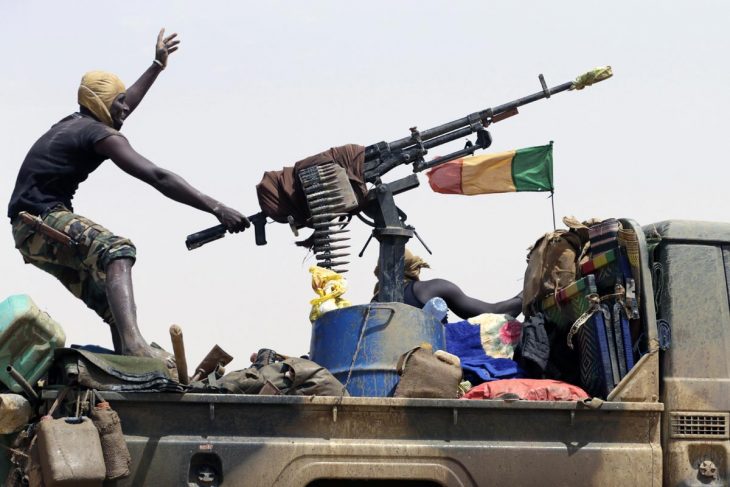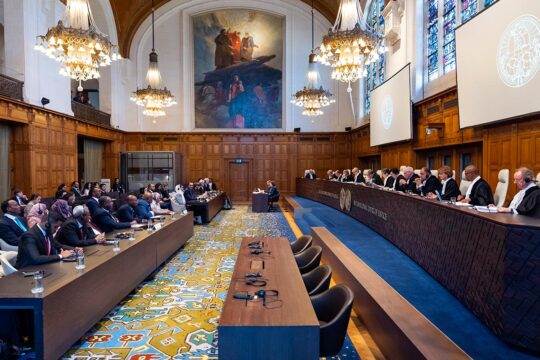“Public hearings on emblematic cases of violations in Mali should be held in March in all the regions where there are branches of the Commission,” Commission chairman Ousmane Oumarou Sidibé announced at the December 20 opening of a branch in Kidal, northeast Mali. He thus recognized that his commission, now near the end of its mandate, is far from having completed its work. He also seems sure that the Commission will obtain from the government an extension of its mandate, so as to make up for delays due mainly to the climate of insecurity. “Creating a commission in the middle of an armed conflict generates additional challenges linked to how the national and regional political and security situations develop,” said the Commission chairman.
The Commission was set up after the signing of a peace accord that was seen at that time as historic, but fighting has not stopped. Bloody clashes have continued and there has been a rise in terrorist attacks, especially in the north and centre of the country. This is the case in the extreme northern region of Kidal, considered the epicentre of the separatist rebellion launched in 2012. Worsening security there has delayed the setting up of an interim administration as provided by the peace deal, and thus also of the regional branch of the Commission.
A vast mandate
The other constraint stems from the vast temporal mandate of the Commission. When we talk of the truth commission, it is the crisis sparked in 2012 that comes to mind. But the mandate of this commission is much wider. It is charged with shedding light on the crises, conflicts and violent events in Mali between 1960 and the present day, with the aim of establishing the truth and contributing to justice and reconciliation. Its mission includes investigating cases of grave violations of human rights committed in the country – especially those committed against women and children –, attacks on individual and/or collective remembrance and cultural heritage, and promoting dialogue within and between communities.
In the regions of Bamako, Gao, Tombouctou, Mopti and Ségou, where the Commission has been able to launch its activities, there are also problems linked to the reticence of victims, according to Khalifa Yaro, a lawyer specialized on transitional justice. “The victims do not have the necessary assurances, there is no network allowing them to express themselves freely, whereas a transitional justice process requires reaching the maximum number of victims possible,” he said in an interview with JusticeInfo.
10,223 statements gathered
The Commission has nevertheless gathered some 10,223 from witnesses and victims since January 2017. “Most of the victims have come in person to the regional offices to file their statements,” the Commission chairman explained at a recent press conference in Bamako. Members of the Commission have also been to Malian refugee camps abroad to take statements. Ousmane Oumarou Sidibé says most of them relate to the crisis of 2012.
The Commission says it has also held hearings of important witnesses in order to establish the nature, causes and circumstances of the conflict in the north of the country and put them in the overall historical, social, economic and cultural context of Mali. According to Sidibé, these witnesses have been invited to discuss several issues, including the coups d’État, rebellions, droughts and human rights violations, the aim being not so much to identify or sanction those responsible but to know the roots of the recurring crises the country has suffered. “We do not judge the perpetrators, our mission is to establish the truth on what has happened,” he explained. “As well as filing statements to the Commission, victims can file complaints to the judicial authorities, for each has a role to play in the process.”
The sensitive issue of reparations
Since January 2018, consultations have also been under way as part of preparing a policy document on reparations, another aspect of the Commission's mandate. Once the consultations are completed, the Commission is to draft a proposed law on reparations policy, which will be submitted to the government. This policy is to be implemented by another body to be set up for this purpose.
But the victims are getting impatient. "What we regret is that no victims have yet obtained compensation," said Mody Samba Touré, honorary president of the National Coordination of Victims' Associations (CNAV), quoted in early December by the Malian online newspaper Bamada.net. Pending the establishment of the reparations mechanism, the Commission ensures that victims in need of urgent psycho-medical care are referred to the relevant services to receive treatment.
According to Ibrahim Coulibaly, one of the Commission’s 25 members, the Commission should be able to file its end-of-mandate report in the coming days whilst also requesting an extension that many observers believe is essential. Only then would the major phase of the public hearings begin. Khalifa Yaro thinks it is therefore premature to say whether the Commission has fulfilled its mandate, or to judge its contribution to the process of unity and reconciliation. "Because," says the lawyer, "it will all depend on how the Commission's final report and recommendations are used.”







